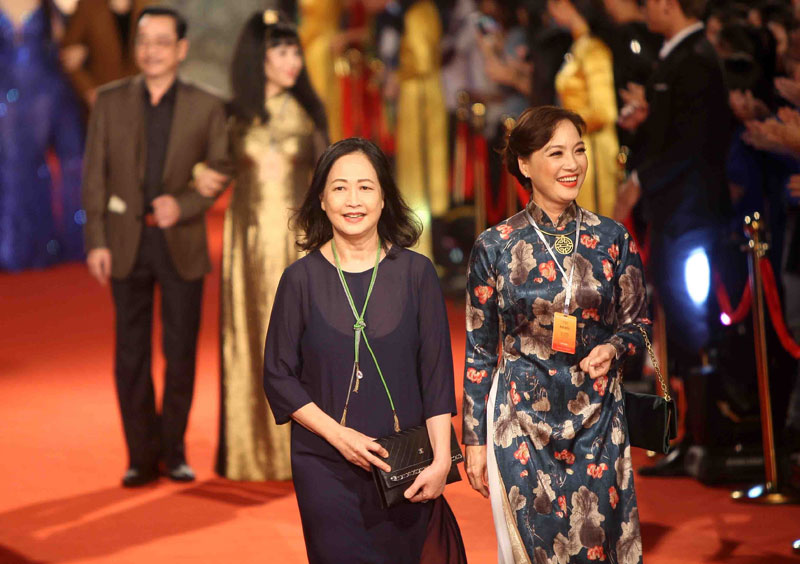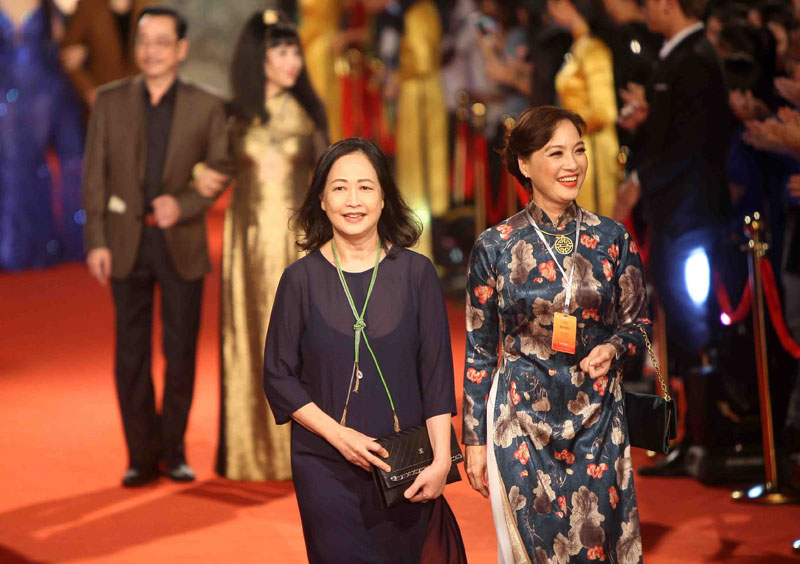
The 5th Hanoi International Film Festival (HANIFF), themed "Cinema – Integration and Sustainable Development”, opened at the Cultural Friendship Palace on October 27.
Vietnamese artists on the
red carpet at the opening of the5th Hanoi
International Film Festival on October 27 (Photo: VNA)
Opening the event, Minister of Culture,
Sports and Tourism Nguyen Ngoc Thien said the 5th HANIFF honours the true
cinematic talents and looks towards human values and sincere cooperation.
Its categories have been expanded to welcome films from all countries and
territories, thus creating a big opportunity for Vietnamese and global
cinematic artists to share experience to help develop cinema in the country and
around the world, he noted.
This year’s festival features 147 outstanding films from nearly 50 countries
and territories, including more than 40 films of Vietnam. Many of them have never
been screened at other Asian film festivals.
Aside from entries vying for awards, the biennial event also has a non-competition
section with outdoor film screening, exchanges, and a fashion show. In this
section, seminars will introduce Polish cinema and share success experience of
Iranian films.
Other activities include a project market, a script-writing camp, and an
exhibition on filming locations in Vietnam.
Japanese film "Shoplifters” directed by Hirokazu Koreeda opened the festival.
The screenings will take place at the National Cinema Centre (No. 87, Lang Ha
street), the Thang Tam cinema (No.45, Hang Bai street), the Kim Dong cinema
(No. 19, Hang Bai street) , and the BHD Star Vincom cinema (No. 2, Pham Ngoc
Thach street).
The 5th HANIFF, held by the Ministry of Culture, Sports and Tourism and the
Hanoi People’s Committee, will last through October 31.
Source: NDO
With an increasingly vibrant and widespread emulation movement aimed at building cultured residential areas and cultured families, Yen Thuy District has been making steady progress toward improving both the material and spiritual well-being of its people, while fostering a civilized, prosperous, beautiful, and progressive community.
Once lacking recreational spaces and community facilities, Residential Group 2 in Quynh Lam Ward (Hoa Binh City) has recently received attention for the construction of a new, spacious, and fully equipped cultural house. The project followed the model of state support combined with public contributions in both labor and funding.
The "All people unite to build cultural life" movement, which has been effectively integrated with Kim Boi district’s socio-economic development goals, is fostering a lively spirit of emulation across local residential areas, hamlets, villages, public agencies, and enterprises. In addition, through the initiative, traditional cultural values are being preserved and promoted, while community solidarity and mutual support in poverty reduction and economic development are being strengthened.
A working delegation of the Hoa Binh provincial People’s Committee led by its Permanent Vice Chairman Nguyen Van Toan on June 11 inspected the progress of a project to build the Mo Muong Cultural Heritage Conservation Space linked to tourism services in Hop Phong commune, Cao Phong district.
Born and growing in the heroic land of Muong Dong, Dinh Thi Kieu Dung, a resident in Bo town of Kim Boi district, in her childhood was nurtured by the sweet lullabies of her grandmother and mother. These melodies deeply imprinted on her soul, becoming an inseparable part of her love for her ethnic group's culture. For over 20 years, this love for her hometown has driven Dung to research, collect, and pass down the cultural values of the Muong people to future generations.
In the final days of May, the Ethnic Art Troupe of Hoa Binh Province organized performances to serve the people in remote, mountainous, and particularly disadvantaged areas within the province. These were not just ordinary artistic shows, but they were the meaningful journeys aimed at spreading cultural values, enhancing the spiritual life of the people and contributing to the preservation of ethnic minority cultural identities.



